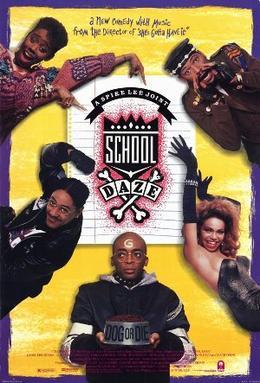Spike Lee has a reputation as a filmmaker to fearlessly drag racial issues into the social consciousness. Last Wednesday night, at an event sponsored by the black studies department, a group of educators and students came together at Ragtag Cinema to watch Lee’s second film, _School Daze_ (1988), and the ensuing conversation felt all too relevant.
_School Daze_ is a musical comedy about contrasting cliques at Mission College, a fictional historically black college in Atlanta comparable to Morehouse, Lee’s alma mater. Greeks battle non-Greeks. Locals stand against out-of-towners. The upperclassmen push around the freshmen.
The film is set on homecoming weekend, and campus life is easily recognizable. The parade, the coronation ceremony and the cheering crowds at the football game all play an important role at Mission, just as at MU, but even more reminiscent of recent events was the evidence of tangible racial conflict.
A group of protesters interrupt the Mission parade to show their disapproval of apartheid in South Africa. The image brought back memories of Concerned Student 1950 during MU’s 2015 Homecoming parade. Even more jarring is when the group’s banner is stolen from them and they are forcibly removed from the parade.
After the screening Wednesday, a panel moderated by Charles Nilon of the School of Natural Resources discussed the similarities between Mission and MU. Darlene Grant, an MU graduate who is an assistant principal at Rock Bridge High School, started the conversation by talking about the shantytowns she remembers seeing on Francis Quadrangle as a student in the late ’80s.
The shantytowns, or small clusters of cardboard boxes signifying disapproval of apartheid in the late 1980s, were being compared to 1960s civil rights rallies, so it is no surprise that last year’s events are now being compared to the shantytowns. It proves that college-aged youth have always played an important role in the ongoing fight for civil rights.
“I get excited when people come together,” Grant said. “[The protesters] were part of a greater cause, and there was movement … just as there was movement on the university’s part to do some things to increase diversity because of Concerned Student 1950.”
One of the most pronounced conflicts present in _School Daze_ is the violent division between the “wannabes” and the “jigaboos,” two derogatory terms signifying those who “want to be white” and those who embrace their distinctly African characteristics.
The panelists, all of whom are high school teachers or administrators, found this intraracial division to be a convenient means of transitioning into the larger discussion of contemporary black education.
Though Grant and Battle High School assistant principal Melita Walker vividly remember social pressures to ‘look white’ and ‘be black,’ they both agree that these pressures don’t seem to affect current students. They believe black students are more unified than those present in a late-1980s Spike Lee film.
Responding to this comment, MU black studies department Chairwoman Stephanie Shonekan, in the audience, asked the panelists whether any of the educators had noticed a division between black students and African students, meaning those students who spent a portion of their life on the African continent.
Walker had indeed noticed the division. She assigns responsibility to a “lack of cultural understanding and cultural awareness” on the part of African-American students. African students, on the other hand, “know their history,” Walker said, and as a result, their traditional African values sometimes prevent them from pursuing relationships with other students.
Grant said one of the solutions to this problem is to make the “history of black people part of the norm,” particularly in educational environments. She finds it aggravating that black “history is deeply rooted in all parts of American history, but it doesn’t come out until February,” which is Black History Month.
Walker continued this train of thought by saying that black students need black role models. She still remembers the two black educators she had growing up: One was in fifth grade, and the other was in high school.
“I remember their names because they made the biggest impact on me,” Walker said.
As evidenced by the gravity of the panelists’ discussion, Spike Lee’s films are highly effective at evoking meaningful discourse, and _School Daze_ is only one of many. His timeless classic _Do the Right Thing_ and his most recent narrative feature, _Chi-Raq_, are just a few of his other films that add to the race discussion in America and constantly remind viewers to “Wake up!”








